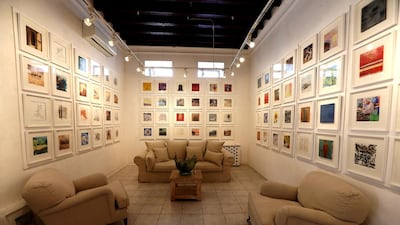When the boundary of Dubai skimmed the Creek and camels wandered through the desert beyond, when the Dubai Police Band paraded through the city on National Day, and when the expat community numbered about 2,000 – that’s when Alison Collins and her now late husband settled in the emirate.
That was in 1976, and two years later they moved into a wind-tower house in Al Fahidi (formerly known as Bastakiya) and raised their family there.
Collins was as passionate about art then as she is today, so when a travelling artist by the name of Julian Barrow knocked on her door in 1979, she offered him bed and board in exchange for his paintings.
“He was a wonderful painter,” she remembers. “I had always had a fascination with Orientalist painting and it was as if Julian was an extension of their spirits. His work was like a travelogue of a fast-disappearing world.”
Collins moved all the furniture out of the family majlis and into the garden to make room for his paintings, and invited friends over to see them. And so the foundations of Majlis Gallery, the first established gallery in the UAE, were built.
For a decade, Collins continued to take in wandering artists and host evening soirées to exhibit and celebrate art until the old house, seen as a relic amid the rapidly modernising Dubai, was issued with a demolition order.
The family was forced to move out and say goodbye to their beloved home. But thankfully, their neighbourhood was not destroyed; a last-minute decision was taken to save the old houses and four months later, Collins was given the chance to move back in.
“But I couldn’t uproot the family again; it was traumatic to leave in the first place,” she says. “That was when I had the idea to turn it into a gallery.”
Enlisting a team of people, including her former landlord, Collins officially opened the gallery in November 1989.
The first exhibition was a group of pieces that she had collected over the years but her first solo show was with John R Harris, a prominent watercolour artist from Dubai. Although she has “been through two Gulf wars and three recessions”, and receives numerous pleas from visitors and guests to move to somewhere more accessible, Collins has stuck to her own convictions.
“The house is what makes this place what it is,” she says. “The hardest thing has been retaining our values and ethos when the market itself seemed to be going in a different direction, and this latest recession did hit us really hard, but we have survived and I think that is because it is about the people. The word majlis says it all – it is a meeting place for artists and art lovers and anyone who is interested at all in the creative side of life.”
In the past 25 years, Collins has provided a platform for artists whose names are now known on a global stage. Abdul Qader Al Rais, one of the UAE’s greatest painters, who specialises in landscapes and architectural-style works, had his first exhibition there in the early 1990s.
Abdul Latif Al Smoudi, the late Syrian painter, who was a long-term resident of Sharjah and also one of the most revered artists of his generation, began exhibiting in the gallery in 1994. Khaled Al Saai, a master calligrapher whose work is sold internationally, is also represented through Collins’ gallery, as is Mustafa Ali, one of Syria’s foremost sculptors.
Artists from around the world still come to the gallery, taking inspiration from the authenticity of the area as well as the desert environment and all the work is displayed in the gallery.
“What makes us different from other galleries is that when visitors come here, they can be assured that they will always find art from the artists we represent,” says Collins. “We don’t just put up work for a few weeks and take it down – this is continual representation.”
While this means she will never have the fluidity of the curated shows that rotate through other gallery spaces across the UAE, she has a constant stream of guests trickling through her doors and customers who return time and again.
“I don’t think you need to evaluate one gallery against another,” says Collins. “You are as good as your relationships with your clients and your artists and I am very fortunate that our artists and our clients trust us implicitly.”
• Majlis Gallery is located in Al Fahidi Historical Neighbourhood, Dubai. For more information, visit www.themajlisgallery.com or call 04 353 6233
aseaman@thenational.ae

